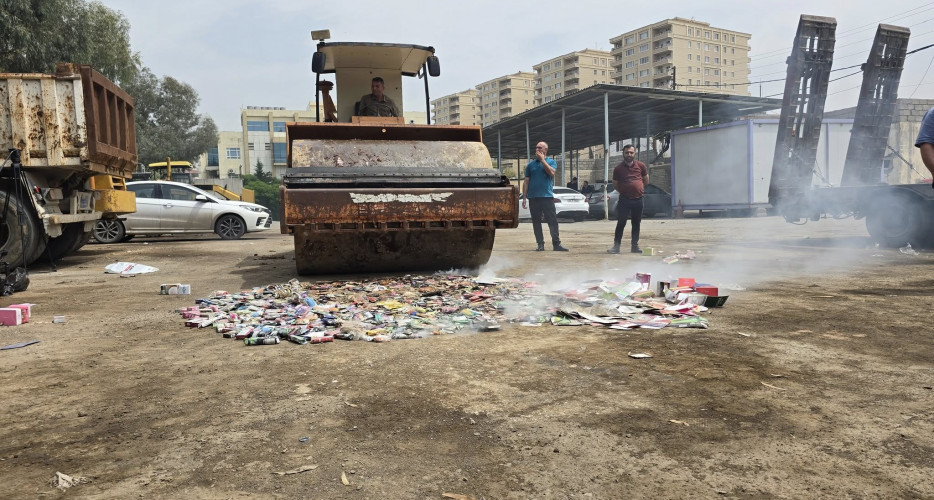
Peregraf
Despite an official ban on the sale of e-cigarettes and vapes in parts of the Kurdistan Region, the underground market—especially online—continues to thrive, evading government oversight.
In Erbil and Duhok, the trade, sale, and distribution of all types of vapes are officially prohibited. Surveillance teams are deployed regularly to track and confiscate these products from shops and public markets.
However, for people like Parzhin (a pseudonym), a young woman from Duhok, gaining access to vapes remains surprisingly easy. "I have four or five friends who vape like me. A lot of girls and women are using them. We know it's harmful, but we’re used to it now and quitting is difficult," she said.
Vapes are widely advertised on social media platforms and sold discreetly across Erbil and Duhok. In Sulaimani, by contrast, there is no such restriction, and the product is readily available in open markets. According to a Peregraf investigation, even children as young as 10 can purchase vapes without fear of legal consequences.
"It’s not only bad for your health, but it’s financially draining too," Parzhin added. "Unlike traditional cigarettes, vapes are much more expensive—ranging from 5,000 to over 30,000 dinars." She said she learned how to use them from a friend, and that carrying and hiding them is simple.
Erbil banned vapes in May 2023 under its anti-smoking regulations. In June 2025, the provincial administration reported seizing and destroying more than 50,000 vapes and e-cigarettes. Duhok followed with its own ban in early 2024, and according to figures obtained by Peregraf, 54 shops have been penalized and 8,200 vapes confiscated and destroyed so far.
"We strictly punish any shop owner who sells vapes," said Shukri Shafiq, spokesperson for Duhok’s Trade Supervision Department. "We will not show leniency toward any violators."
Shafiq insisted that vapes are no longer allowed through border crossings and customs. "What remains in circulation are products that were already in the market before the ban. Soon, it will be completely eradicated," he said confidently.
Duhok province, which shares borders with Turkey and Syria, has two official border gates. The province consists of seven districts and 31 sub-districts, with a population exceeding 1.3 million.
Researcher Peri Barwari believes that the allure of banned substances plays a role in rising usage. "Curiosity is powerful. I’ve spoken with girls who’ve said: ‘What do drugs feel like? I want to try them,’ and the same applies to vapes and cigarettes."
Under Kurdistan Parliament Law No. 31—aimed at reducing cigarette and hookah use—smoking in public places carries a fine of 10,000 dinars. However, enforcement is weak, and the law does not explicitly address electronic cigarettes.
Ironically, since the ban, demand has increased. Vape prices now range from 30,000 to over 70,000 dinars depending on type and quality.
Millat Zukri, head of the Monitoring Committee in Duhok Governorate, told Peregraf that inspections are ongoing in shops previously known to sell vapes. "If we catch any seller violating the ban, they will face financial penalties and possible closure," he said.
"People often claim that vapes are still being sold somewhere. If anyone has information, they should report it. If we don’t shut them down, then they can criticize us," Zukri added.
In the past year alone, 33 shops have been closed in Duhok for selling vapes, with fines ranging from 50,000 to 1 million dinars. "None of these cases have gone to court; all have been dealt with by the governorate’s internal committees," Zukri confirmed.
Medical experts warn that vaping is no safer than smoking. According to the World Health Organization and numerous health studies—as well as the Kurdistan Regional Government’s own Health Ministry—vapes can be just as dangerous as traditional cigarettes, if not more so.
"Vaping and smoking both lead to lung and throat cancers, chronic chest pain, and respiratory issues," said Dr. Chakdar Ahmad, an oncologist in Duhok. He urged the government to take more decisive action—such as increasing tariffs on tobacco imports, banning vape imports at borders, and issuing clearer age-related smoking regulations.
Although Iraq had previously banned electronic cigarettes nationwide, the Council of Ministers lifted the restriction in late May 2025 with the endorsement of the Ministry of Health—further complicating enforcement at the regional level.